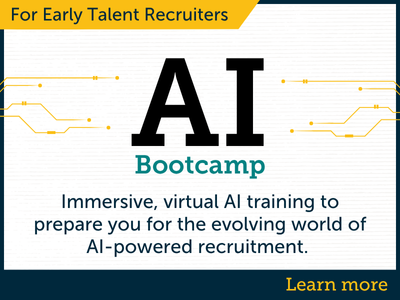Spotlight for Career Services Professionals
Recruiting, onboarding, and retaining employees are not one-size-fits-all processes, and there are challenges throughout. This is especially true for neurodiverse students. However, Kolleen Sullivan says there are ways career services professionals can support and prepare these students to help them make a successful transition to the workplace.
“It is hard to identify someone who is neurodiverse and categorize them as a whole, because everyone has their unique challenges when being recruited, onboarded, or retained,” says Sullivan, training manager for the Case Western Reserve University Professional Development Center and the co–lead for the Individuals Serving and Recruiting Individuals with Disabilities NACE Affinity Group.
Sullivan, who will be the moderator of the “Student Voices: Not Everyone Works for Everyone” student panel during NACE’s Disability Signature Series, offers several examples of these challenges, including students being conflicted because they are fearful of disclosing, but know it may help them in the job search, or them navigating the nuances of the interview process, such as how to get into the company building.
“These are roadblocks a neurodiverse person may face before they even think about applying for a position,” Sullivan says.
“Many students I have worked with have shared their concerns regarding when, how, who, and if they should disclose their diagnosis to an employer due to stereotyping or being rejected instantly, although there are legal ramifications.”
She explains that one high hurdle is the interviewing process. Typical interviews and the styles that employers use do not work for everyone.
“A traditional interview scenario during which a candidate sits in front of a person or a group of people and answers questions about themselves or how they would handle a situation does not necessarily indicate one’s true ability or skill set that would benefit the job in question,” Sullivan explains.
Many employers, she continues, are adjusting this traditional model of interviewing by moving toward an interview process that allows a candidate to perform a task or evaluate a situation, similar to a case study model. Others are allowing individuals who identify as neurodiverse to perform a project or teamwork simulation, which allows the employer to see how that individual works within a team or independently.
“Anyone can take on their challenges by receiving support that will help them to understand how the challenges affect them physically, mentally, and emotionally,” Sullivan says.
“Once students understand the challenges, they can determine strategies to help navigate the barriers they are facing. This process does not happen overnight; it takes time, understanding, and practice to work through.”
For example, developing and practicing techniques for a student who has a hard time maintaining eye contact when they are in an interview will allow them to become more comfortable in this setting.
“Often,” she says, “a person with a disability may need to learn to adapt a task of their position in a different way and practice until they feel confident. Some challenges will always be present, and the student will need to face them head on. This is a practice in problem solving and developing the ability to work through problems when they arise, and feeling comfortable doing so without feeling defeated.”
Career services professionals can help neurodiverse students in many other ways.
“One way is to just be available, get to know the student, and meet them where they are,” Sullivan says.
“A mentor gave me the greatest advice: ‘When you meet one person with a disability, you only meet one person.’ Every person with a disability is different and handles and works through things differently, so you cannot assume that one approach is always going to work.”
Sullivan recommends that career services professionals stay up to date, know the resources available, and have knowledge of the employers that support individuals with disabilities.
“Career services practitioners are the educators and advocates for the individual and for the employer,” she notes.
“There is support available for career services staff who don’t know what to do or how to advocate for a student with a certain disability. This is why we have our professional networks. There are professional groups, organizations, and resource groups available to provide advice and guide them.”
This is especially important because the needs of neurodiverse students—and the employers that recruit and hire them—evolve and change. Furthermore, the types of programming, development, and support career centers can provide to neurodiverse students to maximize their career exploration and job search differs, just as it does for neurotypical students.
“Although everyone goes through some type of career development process, not everyone will start this process at the same stage and time during their college career,” Sullivan says.
“Some individuals come into college knowing exactly what they want to do and know what it is going to take to get there; others may be less sure. Student with disabilities are no different in these feelings. Remember, everyone needs to go on interviews, everyone needs a resume and a cover letter, and everyone should have professional branding for themselves. However, that doesn’t mean your approach will work for everyone. Acknowledging that is the first step.”
Based on her experience, Sullivan believes every student would benefit from programs that help them identify and develop skills for their professional identity. A student with a disability, however, also needs to learn how to navigate their disability within the type of work they want to do. For example, a student with a disability may need to learn how to advocate for accommodations they need to be successful and learn more about what laws are available to protect them in every stage of the employment process.
“For the job-search process, a disabled student should start early and make themselves stand out as a student within their field,” Sullivan says.
“Just like any other student on a college campus, neurodiverse students should research the type of employers they want to work for, the type of work environment they want to work in, and what benefits come with working for that company, but they should also seek the company’s diversity statement and information on its practices.”
She recommends teaching neurodiverse students key steps and strategies early on, allowing them to practice, become confident in the direction they are going, and set themselves up in different scenarios.
“Some colleges expose students to employers right off the bat,” Sullivan says.
“Give them face time, allow collaboration onsite, have them do small externships to witness a ‘day in the life’ to determine interest in a particular profession. Although many universities offer this option, it often becomes an elective rather than a required class or it is offered too late in the students’ academic career.”
Sullivan says there are pitfalls to avoid when working with this population. She cautions against assuming that a student has a disability based on characteristics they may or may not present.
“When a student discloses to you their disability, then you should use your coaching skills to learn more about the student’s disability, the student’s skill set, and the challenges, if any, they face with their disability,” Sullivan notes.
“Language is so important to understand and use. There is terminology that describes one on the autism spectrum as having ‘superpowers.’ There are many people who would disagree with this terminology as it’s not a superpower to have autism. Autism is a person’s ability to think differently, see patterns, and understand concepts from a non-neurotypical perspective, but it is not a superpower; it is who they are.”
Furthermore, a student identifying with a disability doesn’t mean they are the same as someone who has a similar diagnosis.
“You want to get to know them and learn from them,” she adds.
“As always, it is important for career professionals to be cognizant of our own biases. Do not assume someone can or cannot do something because of their disability or categorize everyone with the same disability in one group and think they share experiences.”
Career centers also need to ask neurodiverse students what they want and need related to support on their college campus.
“The world of higher education, the world of disability, and the world of employment are constantly changing and evolving,” she says.
“We need to educate ourselves, stay up to date, and learn from your other colleagues and professionals.”
Sullivan offers several recommendations for working with and supporting neurodiverse students in their career exploration and job search:
- Have conversations and allow students to share their story.
- Collaborate with disability services to support individuals with disabilities on your college campus.
- Become aware of employers that provide externships, internships, and jobs to individuals with a disability. Work with these employers, help the students know what skills employers need, and start helping them gain those skills through their college experiences.
- When hosting professional events, networking nights, career fairs, or employer panels, include individuals in the professional world who have disabilities.
- Make your office inclusive and accessible.
“These will help students with disabilities be successful in the job-search process and prepare them for the transition to the workplace,” Sullivan says. “Practice, exposure, and consistent communication are crucial.”
Kolleen Sullivan, training manager for the Case Western Reserve University Professional Development Center and the co–lead for the Individuals Serving and Recruiting Individuals with Disabilities NACE Affinity Group, will be the moderator of the “Student Voices: Not Everyone Works for Everyone” student panel during NACE’s Disability Signature Series in Recognition of National Disability Employment Awareness Month.






